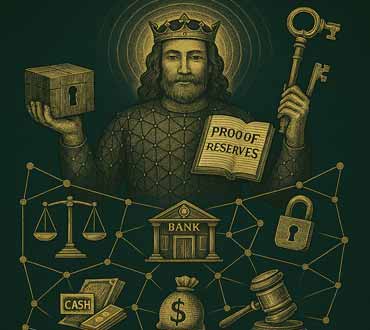Banking was born as safekeeping and then grew into surveillance. What once was a vault and a ledger is
now acting like a permit office for normal life-freezing accounts for opinions, selling profiles as product,
and calling dependency “service”. We answer: not custody if it needs confession. They are payments not
public if they can be privately denied. A bank must be a box, not a boss.
Separate the functions, and the fog lifts. Safekeeping is a narrow service: hold deposits, settle payments,
charge a fee that is transparently defined, take no position with the customer’s funds. Credit is a risky
service: lend at risk, disclose it, and bear losses when bets go wrong. Blend the two and the public becomes
the shock absorber. Keep them distinct, and failure stays where it belongs-on the balance sheet that
caused it.
Visibility beats vibes. Solvency must be proven on a schedule, not asserted in a press release: frequent,
standardized disclosures of reserves, liabilities, maturity mismatches, and off-balance commitments-
numbers a high-schooler can read and a prosecutor can use. If leverage is the business model, price the
risk honestly; if deposits are promises, keep them whole without drama. Accounting that requires faith is
not accounting.
Payments are roads, not sermons. Access must be neutral; priced; and speedy-no backlist created by risk
departments, no political throttling disguised as “brand safety.” Courts should restrict access only upon
court order due process and appeal. Access to paying rent, salary, and taxes without a word from a
platform is not a luxury; it is the foundational layer of an open economy.
Cash being a public safety valve. A society that prohibits cash first outlaws privacy for the underclass. Make
sure lawful cash accepted in such public avenues is with the digital rails, and outlaw “no cash” exclusion
at places where things and services are essential. Should a digital public option exist, it should uphold all
qualities cash possesses: low fees, some offline tolerance, and usage possible without registration for
everyday small amounts.
Bailouts rot character. When institutions gamble, losses belong to equity and unsecured creditors, not the
public. Deposit insurance should only protect small savers and be transparently priced on risk, but expand
with appropriate supervision. Rescue executives and boards last, if ever. The state of mind called being
“too big to fail” is an admission that supervision has failed.
Portability, discipline, and power. Allow customers to move accounts in days rather than months.
Standardize interfaces so payments, payees, and history travel with the person, not the provider. If it takes
a great deal of effort to exit, then abuse is cheap. If exit is easy, service improves or disappears.
Compliance must be code, not theatre. Replace labyrinthine forms with testable rules; publish clear
thresholds and time limits; audit outcomes rather than paperwork. Suspicion cannot be the default state
of the citizen. Investigate crime vigorously-after probable cause-not by turning everyone into a file.
A banking system may not be measured in terms of the height of its towers but by the quiet of its mornings.
Are wages running late? Is there a “review” that throttles small businesses? Are remittances chipped by
tolls unrelated to cost? If so, the system brags while starving the street. Banks exist to keep promises that
households and firms cannot keep alone; everything else is vanity.
Our tactics are going to match ends; we will have institutions with proven reserves and published fees, use
community banks and credit unions where accountability is almost outside the teller’s window, keep
redundancy across providers, hold part of savings outside speculation, and refuse vendors that punish
lawful speech with private sanctions. We will teach our children two sentences: “Let your money work for
you,” and “No one should work you for your money.”
This isn’t a call for smashing; it is a call to simplify and answer for the outcomes. Keep custody narrow,
credit honest, payments neutral, privacy real, and exit easy. Our signature is solvency; our seal is
portability; our receipt is ordinary life that clears without permission. Let the age of banking by indulgence
end here, under our names, while we can still choose what a bank is for.








